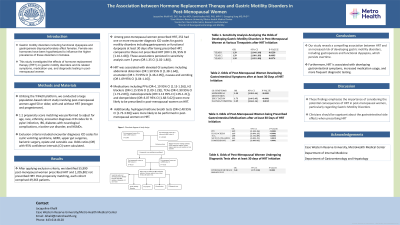Monday Poster Session
Category: Stomach
P3327 - The Association Between Hormone Replacement Therapy and Gastric Motility Disorders in Post-Menopausal Women
Monday, October 28, 2024
10:30 AM - 4:00 PM ET
Location: Exhibit Hall E

Has Audio

Jacqueline Khalil, MS, DO
Case Western Reserve University/Metro Health
Beachwood, OH
Presenting Author(s)
Jacqueline Khalil, MS, DO1, Yan Sun, MD2, David Kaelber, MD, PhD, MPH3, Gengqing Song, MD, PhD4
1Case Western Reserve University/Metro Health, Beachwood, OH; 2Case Western Reserve University / MetroHealth, Cleveland, OH; 3Case Western Reserve University/Metro Health, Cleveland, OH; 4Metrohealth Medical Center, Cleveland, OH
Introduction: Gastric motility disorders including functional dyspepsia and gastroparesis disproportionately affect females. Female sex hormones have been hypothesized to influence the higher prevalence of these disorders in females. This study investigated the effects of hormone replacement therapy (HRT) on gastric motility disorders and its related symptoms, medication use, and diagnostic testing in post-menopausal women.
Methods: Utilizing the TriNetX platform, we conducted a large population-based cohort study involving post-menopausal women aged 50 or older, with and without HRT (estrogen and progesterone). 1:1 propensity score matching was performed to adjust for age, race, ethnicity, encounter diagnoses ICD codes for H. pylori infection, IBS, diabetes with neurological complications, nicotine use disorder, and NSAIDs. Exclusion criteria included encounter diagnoses ICD codes for cyclic vomiting syndrome, GERD, upper gut surgeries, bariatric surgery, opiate and cannabis use. Odds ratios (OR) with 95% confidence intervals (CI) were calculated.
Results: After applying exclusion criteria, we identified 55,990 post-menopausal women prescribed HRT and 1,205,802 not prescribed HRT. Post-propensity matching, each cohort comprised 49,363 patients. Among post-menopausal women prescribed HRT, 252 had one or more encounter diagnosis ICD codes for gastric motility disorders including gastroparesis or functional dyspepsia at least 30 days after being prescribed HRT, compared to those not prescribed HRT (OR=1.39, 95% CI [1.16-1.68]). These associations persisted in sensitivity analysis over 3 years (OR 1.35 CI [1.02-1.80]). HRT was associated with elevated GI symptoms including abdominal distention (OR 1.50 95% CI [1.38-1.64]), eructation (OR 1.73 95% CI [1.46-2.05]), nausea and vomiting (OR 1.09 95% CI [1.04-1.16]). Medications including PPIs (OR=1.19 95% CI [1.13-1.26]), H2 blockers (OR=1.15 95% CI [1.09-1.23]), TCAs (OR=1.90 95% CI [1.73-2.09]), metoclopramide (OR=1.13 95% CI [1.05-1.21]), and domperidone (OR=3.07 95% CI [1.68-5.62]) were more likely to be prescribed in post-menopausal women on HRT. Additionally, hydrogen/methane breath tests (OR=2.48 95% CI [1.72-3.58]) were more likely to be performed in post-menopausal women on HRT.
Discussion: HRT is associated with an increased risk of developing gastric motility disorders, which persists over time. Furthermore, HRT is associated with developing gastrointestinal symptoms, increased medication usage, and more frequent diagnostic testing.
Disclosures:
Jacqueline Khalil, MS, DO1, Yan Sun, MD2, David Kaelber, MD, PhD, MPH3, Gengqing Song, MD, PhD4. P3327 - The Association Between Hormone Replacement Therapy and Gastric Motility Disorders in Post-Menopausal Women, ACG 2024 Annual Scientific Meeting Abstracts. Philadelphia, PA: American College of Gastroenterology.
1Case Western Reserve University/Metro Health, Beachwood, OH; 2Case Western Reserve University / MetroHealth, Cleveland, OH; 3Case Western Reserve University/Metro Health, Cleveland, OH; 4Metrohealth Medical Center, Cleveland, OH
Introduction: Gastric motility disorders including functional dyspepsia and gastroparesis disproportionately affect females. Female sex hormones have been hypothesized to influence the higher prevalence of these disorders in females. This study investigated the effects of hormone replacement therapy (HRT) on gastric motility disorders and its related symptoms, medication use, and diagnostic testing in post-menopausal women.
Methods: Utilizing the TriNetX platform, we conducted a large population-based cohort study involving post-menopausal women aged 50 or older, with and without HRT (estrogen and progesterone). 1:1 propensity score matching was performed to adjust for age, race, ethnicity, encounter diagnoses ICD codes for H. pylori infection, IBS, diabetes with neurological complications, nicotine use disorder, and NSAIDs. Exclusion criteria included encounter diagnoses ICD codes for cyclic vomiting syndrome, GERD, upper gut surgeries, bariatric surgery, opiate and cannabis use. Odds ratios (OR) with 95% confidence intervals (CI) were calculated.
Results: After applying exclusion criteria, we identified 55,990 post-menopausal women prescribed HRT and 1,205,802 not prescribed HRT. Post-propensity matching, each cohort comprised 49,363 patients. Among post-menopausal women prescribed HRT, 252 had one or more encounter diagnosis ICD codes for gastric motility disorders including gastroparesis or functional dyspepsia at least 30 days after being prescribed HRT, compared to those not prescribed HRT (OR=1.39, 95% CI [1.16-1.68]). These associations persisted in sensitivity analysis over 3 years (OR 1.35 CI [1.02-1.80]). HRT was associated with elevated GI symptoms including abdominal distention (OR 1.50 95% CI [1.38-1.64]), eructation (OR 1.73 95% CI [1.46-2.05]), nausea and vomiting (OR 1.09 95% CI [1.04-1.16]). Medications including PPIs (OR=1.19 95% CI [1.13-1.26]), H2 blockers (OR=1.15 95% CI [1.09-1.23]), TCAs (OR=1.90 95% CI [1.73-2.09]), metoclopramide (OR=1.13 95% CI [1.05-1.21]), and domperidone (OR=3.07 95% CI [1.68-5.62]) were more likely to be prescribed in post-menopausal women on HRT. Additionally, hydrogen/methane breath tests (OR=2.48 95% CI [1.72-3.58]) were more likely to be performed in post-menopausal women on HRT.
Discussion: HRT is associated with an increased risk of developing gastric motility disorders, which persists over time. Furthermore, HRT is associated with developing gastrointestinal symptoms, increased medication usage, and more frequent diagnostic testing.
Disclosures:
Jacqueline Khalil indicated no relevant financial relationships.
Yan Sun indicated no relevant financial relationships.
David Kaelber indicated no relevant financial relationships.
Gengqing Song indicated no relevant financial relationships.
Jacqueline Khalil, MS, DO1, Yan Sun, MD2, David Kaelber, MD, PhD, MPH3, Gengqing Song, MD, PhD4. P3327 - The Association Between Hormone Replacement Therapy and Gastric Motility Disorders in Post-Menopausal Women, ACG 2024 Annual Scientific Meeting Abstracts. Philadelphia, PA: American College of Gastroenterology.
